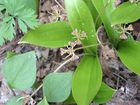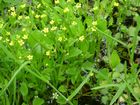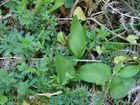Note: This is a project under development. The articles on this wiki are just being initiated and broadly incomplete. You can Help creating new pages.
Difference between revisions of "Ophioglossum engelmanni - Limestone adders tongue"
(→Photo Gallery) |
|||
| Line 45: | Line 45: | ||
==Photo Gallery== | ==Photo Gallery== | ||
<gallery class="left" caption="" widths="140px" heights="140px"> | <gallery class="left" caption="" widths="140px" heights="140px"> | ||
| − | + | ||
File:გველის ენა Ophioglossum vulgatum Aderr's Tongue.jpg | File:გველის ენა Ophioglossum vulgatum Aderr's Tongue.jpg | ||
File:Adders.jpg | File:Adders.jpg | ||
Revision as of 17:23, 24 May 2019
Ophioglossum vulgatum commonly known as adder's-tongue is a species of fern in the family Ophioglossaceae.
Contents
Uses
Wounds, Internal bleeding, Vomiting, Skin ulcers.
Parts Used
Chemical Composition
Emetic, anti-scrofulous, expectorant, antscorbutic, emollient and nutritive when dry.[1]
Common names
| Language | Common name |
|---|---|
| Kannada | |
| Hindi | |
| Malayalam | |
| Tamil | |
| Telugu | |
| Marathi | NA |
| Gujarathi | NA |
| Punjabi | NA |
| Kashmiri | NA |
| Sanskrit | |
| English | Adderstongue |
Habit
Identification
Leaf
| Kind | Shape | Feature |
|---|---|---|
| Lanceolate | ovel | Leafs irregularly mottled (usually with reddish-brown), are basal, about 6 inches long and 2 inches across, and there are usually two on flowering plants and only one on non-flowering plants. Leaves have a smooth waxy surface |
[2].
Flower
| Type | Size | Color and composition | Stamen | More information |
|---|---|---|---|---|
| Unisexual | 1-1/2inches long,2-7inches high | Green,yellow | April-may months are the flowering season |
Fruit
| Type | Size | Mass | Appearance | Seeds | More information |
|---|---|---|---|---|---|
| Syncarp (sorosis), subglobose or ellipsoid with long echinate processes, orange when ripe | seeds many, ovoid. | {{{6}}} |
Other features
List of Ayurvedic medicine in which the herb is used
- Vishatinduka Taila as root juice extract
Where to get the saplings
Mode of Propagation
How to plant/cultivate
Damp grassland, fens and scrub. [3]
Commonly seen growing in areas
Moist woods or open areas, Moist meadows.
Photo Gallery
- Გველის ენა Ophioglossum vulgatum Aderr's Tongue.jpg
References
External Links
Categories:
- Pages with broken file links
- Ayurvedic Herbs known to be helpful to treat Wounds
- Ayurvedic Herbs known to be helpful to treat Internal bleeding
- Ayurvedic Herbs known to be helpful to treat Vomiting
- Ayurvedic Herbs known to be helpful to treat Skin ulcers
- Herbs with Bulb used in medicine
- Herbs with Roots used in medicine
- Herbs with Leaves used in medicine
- Herbs with common name in English
- Habit - Ferns
- Index of Plants which can be propagated by Spores
- Index of Plants which can be propagated by Rhizomes
- Index of Plants which can be propagated by Plant
- Herbs that are commonly seen in the region of Moist woods or open areas
- Herbs that are commonly seen in the region of Moist meadows
- Herbs




